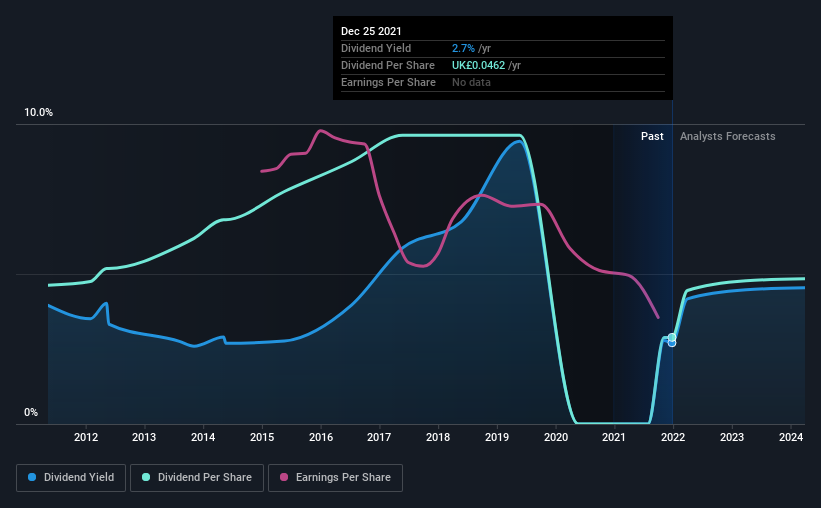Income Investors Should Know That BT Group plc (LON:BT.A) Goes Ex-Dividend Soon
BT Group plc (LON:BT.A) is about to trade ex-dividend in the next three days. The ex-dividend date is usually set to be one business day before the record date which is the cut-off date on which you must be present on the company's books as a shareholder in order to receive the dividend. The ex-dividend date is an important date to be aware of as any purchase of the stock made on or after this date might mean a late settlement that doesn't show on the record date. Thus, you can purchase BT Group's shares before the 30th of December in order to receive the dividend, which the company will pay on the 7th of February.
The company's next dividend payment will be UK£0.023 per share, and in the last 12 months, the company paid a total of UK£0.046 per share. Looking at the last 12 months of distributions, BT Group has a trailing yield of approximately 2.7% on its current stock price of £1.7065. Dividends are an important source of income to many shareholders, but the health of the business is crucial to maintaining those dividends. That's why we should always check whether the dividend payments appear sustainable, and if the company is growing.
Check out our latest analysis for BT Group
Dividends are typically paid out of company income, so if a company pays out more than it earned, its dividend is usually at a higher risk of being cut. BT Group has a low and conservative payout ratio of just 22% of its income after tax. Yet cash flows are even more important than profits for assessing a dividend, so we need to see if the company generated enough cash to pay its distribution. What's good is that dividends were well covered by free cash flow, with the company paying out 0.1% of its cash flow last year.
It's positive to see that BT Group's dividend is covered by both profits and cash flow, since this is generally a sign that the dividend is sustainable, and a lower payout ratio usually suggests a greater margin of safety before the dividend gets cut.
Click here to see the company's payout ratio, plus analyst estimates of its future dividends.
Have Earnings And Dividends Been Growing?
When earnings decline, dividend companies become much harder to analyse and own safely. If business enters a downturn and the dividend is cut, the company could see its value fall precipitously. BT Group's earnings per share have fallen at approximately 18% a year over the previous five years. Ultimately, when earnings per share decline, the size of the pie from which dividends can be paid, shrinks.
The main way most investors will assess a company's dividend prospects is by checking the historical rate of dividend growth. BT Group's dividend payments per share have declined at 4.6% per year on average over the past 10 years, which is uninspiring. While it's not great that earnings and dividends per share have fallen in recent years, we're encouraged by the fact that management has trimmed the dividend rather than risk over-committing the company in a risky attempt to maintain yields to shareholders.
Final Takeaway
Has BT Group got what it takes to maintain its dividend payments? Earnings per share are down meaningfully, although at least the company is paying out a low and conservative percentage of both its earnings and cash flow. It's definitely not great to see earnings falling, but at least there may be some buffer before the dividend needs to be cut. While it does have some good things going for it, we're a bit ambivalent and it would take more to convince us of BT Group's dividend merits.
In light of that, while BT Group has an appealing dividend, it's worth knowing the risks involved with this stock. Case in point: We've spotted 3 warning signs for BT Group you should be aware of.
A common investment mistake is buying the first interesting stock you see. Here you can find a list of promising dividend stocks with a greater than 2% yield and an upcoming dividend.
Have feedback on this article? Concerned about the content? Get in touch with us directly. Alternatively, email editorial-team (at) simplywallst.com.
This article by Simply Wall St is general in nature. We provide commentary based on historical data and analyst forecasts only using an unbiased methodology and our articles are not intended to be financial advice. It does not constitute a recommendation to buy or sell any stock, and does not take account of your objectives, or your financial situation. We aim to bring you long-term focused analysis driven by fundamental data. Note that our analysis may not factor in the latest price-sensitive company announcements or qualitative material. Simply Wall St has no position in any stocks mentioned.

